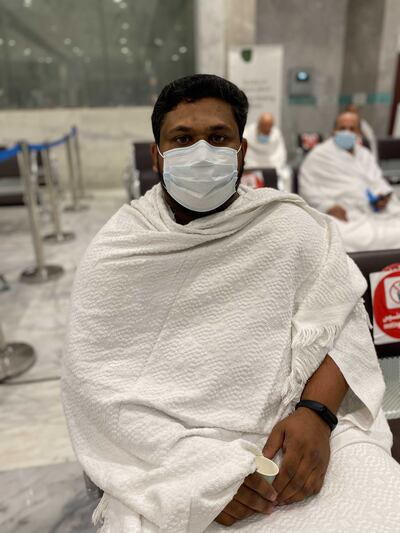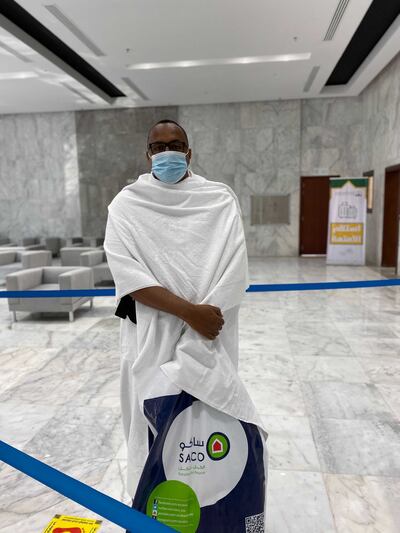Follow the latest updates on Hajj 2021 here
Hajj pilgrims began arriving at the four designated gathering points in Makkah from Saturday morning, with two-thirds of the 60,000 people allowed to participate this year expected to reach the holy city by the end of the day.
Arrivals at Al Zaydi, Al Nouaria, Al Shrayh and Al Hada were divided into three categories, under strict protocols put in place by the authorities to minimise the risk of Covid-19 infections.
The first category is pilgrims who arrive by special Hajj buses from the airport and designated collection points in the cities of Jeddah and Taif. On arrival in Makkah, Hajj permits were checked while pilgrims remained on buses. They were then allowed to continue to the Grand Mosque.
Pilgrims arriving by other buses not authorised to travel to the holy sites were transferred to special Hajj buses after their permits were checked.
Pilgrims arriving in their own vehicles were also transferred to buses, after permits were checked.
Only 20 pilgrims are allowed on each bus, and doors are sealed with a sticker that is removed on arrival at the Grand Mosque.
Once there, pilgrims begin their Hajj by performing the tawaf al qudum – walking around the Kaaba seven times in a counterclockwise direction to express the devotion of Muslims praying to one God.
They must then perform Sa'ey, whereby Muslims re-enact the journey of Hagar, the Prophet Ibrahim's wife, as she travelled between two small hills in Makkah, Al Safa and Al Marwa, in search of water for her son, Ismail. Muslims pace between the two points, which are part of the mosque complex, seven times.
The pilgrims then depart for Mina, where they will stay until Monday morning, when they travel to Mount Arafat.

Among the earliest to arrive in Makkah on Saturday was Shehaz Safialdreen, 35, an Indian who works in the eastern city of Dammam. He said he never expected to be able to perform Hajj so soon after only arriving in the kingdom two years ago.
"I feel this is a gift from Allah. I'm so happy," he told The National with tears in his eyes.
As a result of the pandemic, participation in the Hajj this year was restricted to 60,000 Saudi citizens and residents between the ages of 18 and 65.
Social distancing
Pilgrims will be accommodated in special socially distanced camps of between 55 and 86 tents. For some, the space offered by this year's arrangement is a blessing.
Usually tents house six pilgrims, but this year four will stay in each tent, with dividers between beds, said Abdulraham Al Otaibi, one of the camp’s supervisors.
His camp has 72 tents, serving 45 men in their section and 41 in the women’s section.
In each camp there is also a health clinic, coronavirus testing areas and isolation tents if anyone is ill.
Anyone displaying Covid-19 symptoms will be kept in one of the special isolation tents until the Ministry of Health can take them for testing and, if necessary, onward to hospital.
“The pilgrims are very tired from the long journey. But we tried to make them settle quickly, give them food and show them where their beds are. We do that with a smile on our face,” said Fatmah Al Idrissi, a worker in one of the camps.
A second chance
Among those who had a long journey is 48-year-old Aisha Mohamed from Madinah, who arrived with her sister and niece.
“It’s been a long day but we are finally here. We came from Madinah to the holy mosque and now we are here,” she said.
This is the second time Aisha performed Hajj. The first time was when she was 18.
“I had just married and came with my husband. I don’t think that Hajj counts. I didn’t worship enough,” she said.
She wanted to make up for it this year. Her sister Nasima was excited to come this year after she saw how socially distanced the Hajj was last year because of Covid-19.
“I fear crowds every year and I wanted to visit before but I get scared. Now corona gave us an opportunity for a down-sized Hajj,” she said
Nasima made her first Hajj 40 years ago but it was so crowded that she could not raise the courage to visit again until now.
Her daughter, 18-year-old Wedad Ibrahim, is doing Hajj for the first time.
“I’m so excited and I’m happy it is a small number because like my mother, I fear crowded places,” she said.
From diplomat to Hajji
Only people who are free of chronic illnesses and are either fully vaccinated against Covid-19, or were infected and are fully recovered, were allowed to apply for permits.
Like Mr Safialdreen, Madawi Abdullah, 60, from Riyadh, was also making her first Hajj. "When I first knew I got accepted, I did sujood and cried," she said, referring to the act of bowing in the direction of Makkah.
She said she would be praying for the health and success of her children and grandchildren.
Ibrahim Ali, a Somali, said he had travelled to Makkah with Hajj groups from his country during 12 years of working at Somalia's consulate in Jeddah, but was never able to perform the pilgrimage himself.
"I had many memories of Hajj but never as a Hajji. Now finally I am a Hajji, and I'm so excited, and I feel blessed," he said.


